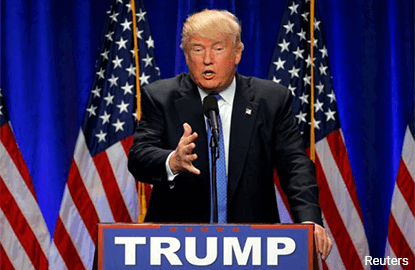
KUALA LUMPUR (July 26): Malaysia's trading position with the United States (U.S.) could turn into a disadvantage, should Republican nominee Donald Trump become the next president of the U.S., according to Nomura Global Markets Research.
In a special report July 25, Nomura said capital markets in Malaysia and Thailand would likely prove to be among the most insulated markets in Asia, given the largely domestic nature of their equity markets.
Nomura said the given outperformance of Malaysia’s exports of manufactured products to the U.S. has partially offset the ongoing slowdown in China.
The research firm has had a relatively positive view over Malaysia’s export outlook since 2014.
"Indeed, not only does the U.S. account for about 10% of total exports, its share of Malaysia’s manufactured exports has risen to 13%, exceeding China’s share which has been shrinking," it said.
It added this exposure to the U.S. has been key in supporting Malaysia’s economic resilience.
Notwithstanding that, Nomura warned that under Trump's presidency, this advantage may turn into vulnerability, if any protectionism leads to less trade activity with the U.S., as it said Malaysia is a very open economy with exports, comprising 90% of its gross domestic product (GDP) in 2015.
Nomura quoted Trump as saying that if he gets elected, he will use all means available to get a "better deal" for the U.S. from its trading partners.
"While we also believe projects under the Economic Transformation Programme should remain intact, the increase in global economic uncertainty would also likely be negative for private sector investment," the research firm said.
Nomura said its GDP forecasts do not explicitly factor in benefits of the Trans Pacific Partership (TPP) agreement, though it would clearly also be a missed opportunity for Malaysia, if Trump scuttles it, despite the fact that the Malaysian parliament ratified it on Jan 27 this year.
"Taking into account indirect channels, Malaysia’s exposure to U.S. trade may be larger," it pointed out.
Although noting that about 13% of Malaysia’s exports go to China, Nomura believes a large chunk of those are intermediate goods meant for assembly into finished products in China, before possibly being exported to the U.S.
Citing an estimate by the Research Institute of Economy, Trade and Industry (RIETI), Nomura said the result suggested 57% of Malaysia’s exports to China were in the form of parts and components.
"This indirect trade channel to the U.S. via China may also come under pressure in a Trump presidency," it added.
According to U.S. Department of State, U.S. is Malaysia's fourth-largest trading partner.